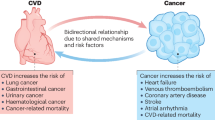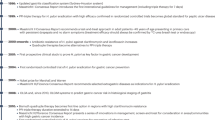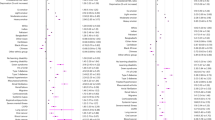Abstract
We analysed data from a case-control investigation conducted in Milan, Northern Italy, to evaluate the relation between the use of combination oral contraceptives and the risk of cancers of the breast, ovary, endometrium and cervix uteri. For the present analysis, 776 cases of histologically confirmed breast cancer, 406 of epithelial ovarian cancer and 170 of endometrial cancer aged under 60 were compared with a group of 1,282 subjects below age 60 admitted for a spectrum of acute conditions apparently unrelated to oral contraceptive use or to any of the known or potential risk factors for the diseases under study. Likewise, 225 cases of invasive cervical cancer were compared with 225 age-matched inpatient controls, and 202 cases of cervical intra-epithelial neoplasia with 202 outpatient controls identified in the same screening clinics. The age-adjusted relative risk estimates for ever vs. never use of combination oral contraceptives were 1.04 (95% confidence interval (CI) 0.73-1.37) for breast cancer, 0.68 (95% CI = 0.48-0.97) for epithelial ovarian cancer, 0.50 (95% CI = 0.23-1.12) for endometrial cancer, 1.49 (95% CI = 0.88-2.55) for cervical cancer and 0.77 (95% CI = 0.50-1.18) for cervical intra-epithelial neoplasia. The risk of ovarian cancer decreased and that of invasive cervical cancer increased with longer duration of use. Neither duration of oral contraceptive use nor time since first or last use significantly altered a user's risk of other neoplasms considered. Likewise, analysis of sub-groups of age, parity or other potentially important covariates did not show any important interaction, and allowance for them by means of logistic regression did not materially modify any of the results. These data confirm that combination oral contraceptives confer some protection against ovarian and endometrial cancers but may increase the risk of invasive cervical cancer if used for several years, and indicate that the past or current pattern of oral contraceptive use in Italy is unlikely materially to affect the risk of breast cancer.
This is a preview of subscription content, access via your institution
Access options
Subscribe to this journal
Receive 24 print issues and online access
$259.00 per year
only $10.79 per issue
Buy this article
- Purchase on Springer Link
- Instant access to full article PDF
Prices may be subject to local taxes which are calculated during checkout
Similar content being viewed by others
Rights and permissions
About this article
Cite this article
La Vecchia, C., Decarli, A., Fasoli, M. et al. Oral contraceptives and cancers of the breast and of the female genital tract. Interim results from a case-control study. Br J Cancer 54, 311–317 (1986). https://doi.org/10.1038/bjc.1986.178
Issue Date:
DOI: https://doi.org/10.1038/bjc.1986.178
This article is cited by
-
Family history in ovarian cancer referral population
Journal of Genetic Counseling (1996)
-
Recency, duration, and progestin content of oral contraceptives in relation to the incidence of endometrial cancer (Washington, USA)
Cancer Causes & Control (1994)
-
Oral contraceptives and the risk of endometrial cancer
Cancer Causes & Control (1991)
-
Cervical cancer and methods of contraception
Advances in Contraception (1991)
-
The application of age, period and cohort models to predict Swiss cancer mortality
Journal of Cancer Research and Clinical Oncology (1990)



